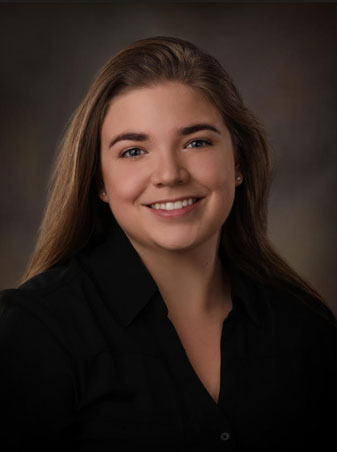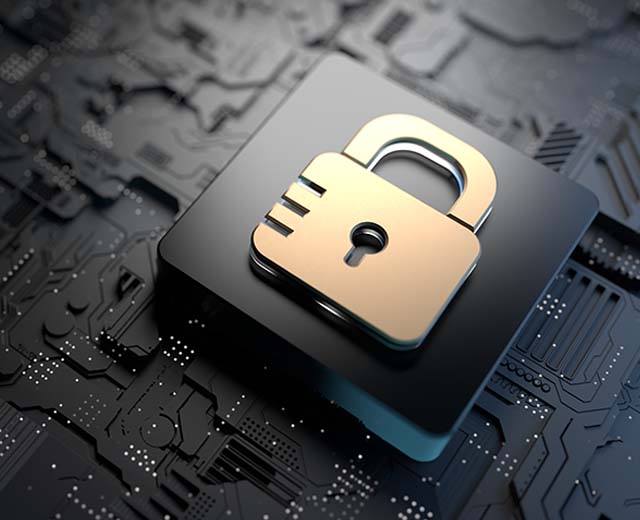In higher education, the need for faculty members who incorporate industry experience into their classes is more necessary than ever, especially in the evolving world of cybersecurity. When students are completing a degree or certificate, it can be helpful for them to visualize the career they would like to pursue with their new credentials. In addition, a well-rounded program that incorporates both academic and real-world scenarios can set students up for success both inside and outside of the classroom.
At University of Maryland Global Campus (UMGC), many of our faculty are experienced leaders in their fields. Each year, UMGC recognizes outstanding faculty members by awarding the Stanley J. Drazek Teaching Excellence Award, the highest accolade UMGC gives to faculty and who are nominated by students.
“The Drazek Teaching Awards represent a prestigious recognition that underscores an educator's exceptional commitment to teaching excellence and student success at UMGC,” said Stefan Gunther, associate vice president for faculty affairs. “They highlight the recipient's innovative teaching methods, dedication to fostering an engaging learning environment and their ability to inspire and mentor, one student at a time.”
During Cybersecurity Awareness Month, UMGC is showcasing three cyber faculty who received the Drazek award this year and highlighting how their real-world experience and current industry work directly benefits their students.
Claire Cuccio's Military Experience Helps Her Motivate Students to Achieve
Claire Cuccio, PhD, is an adjunct associate professor who teaches courses in the Master’s in Cybersecurity Management and Policy program and currently teaches Foundations in Cybersecurity Management (CMP 610). Cuccio spent 30 years in the U.S. Army as a signal corps officer, where she gained skills in cybersecurity that propelled her into her next career.
“When I first [joined the Army], the world wide web was just getting started, and I saw the proliferation of networks and the need to secure them,” says Cuccio. “It was great to be a part of the development of the Internet and cybersecurity, from network creation to policy to organizations. After I retired in 2018, I became CEO of a government consulting company providing cybersecurity services to government clients.”
As a U.S. Army veteran and accomplished leader within the cybersecurity industry, Cuccio is dedicated to ensuring her students view their classes as a professional learning opportunity that they can apply directly to the workforce.
“I view my students as if they were my soldiers. I offer them feedback on assignments as if I were their boss, and the curriculum in my course focuses on solving real-world cybersecurity problems,” says Cuccio. “I try to get them not to look at the problem as schoolwork they have to turn in for a grade, but as solving a complex issue for a company.”
When Cuccio began her position as a faculty member, she connected with UMGC’s mission of being tailored specifically to fit into the lives of working professionals. In addition, her military experience gives her insight into the lives of many of UMGC’s military students as they navigate both school and their careers.
“I really connected with the students and appreciated the full time working professional and part time student, since I can identify with that lifestyle,” says Cuccio. I want them to be excited about the work, and since UMGC focuses on working professionals, it seems to help if the context is their job and the work they are turning in is meaningful and applicable to their professional lives.”
Cuccio directly applies her experiences in the industry into her coursework to better prepare students for what to expect when they begin their career.
“I use real-world vignettes from my past to explain concepts. For example, I was the director of Regional Cyber Center covering Afghanistan and Kuwait during Operation Buckshot Yankee. This was a significant event in cybersecurity and led to the creation of U.S. Cyber Command,” says Cuccio. “From my perspective on the ground, there are tons of examples from this incident that I can use in my class. I believe my past and present work experiences have powerful lessons and are very relevant to our students, many who have jobs supporting U.S. government networks.”
Cuccio goes above and beyond to help her students succeed, such as offering them resume review and career advice. She hopes that her students take their passion for learning beyond their degree and continue their education in as many ways as they can.
“I tell my students they must learn how the network works before they can write effective [cybersecurity] policy. You cannot adequately protect a network if you do not understand what all the pieces do,” says Cuccio. “I highlight free courses, books, and certifications that are available for them to educate themselves. I also highlight scholarships and fellowships in the classroom discussion board and have written many recommendations for students pursuing higher opportunities.”
Steven Richman Prepares Students for Their Careers Through His Industry Experience
Steven Richman, PhD, is an adjunct professor who teaches courses in the Master’s in Cybersecurity Technology program. His current courses include Cyberspace and Cybersecurity foundations (CST 610), Prevention of Cyber Attack Methodologies (CST 620), and Advanced Cyber Exploitation and Mitigation Methodologies (CST 630). Richman has worked for companies including AT&T, AT&T Labs, Lucent Technologies/Alcatel-Lucent Bell Labs, and Signatron, Inc.
Within the technology industry, he was often approached by sales and product teams to present and speak with customers because of his ability to explain technical data solutions in a way that can be understood by a general audience.
“I have held positions in research, systems engineering, software development, operations, testing and business planning, and finance,” says Richman. “I have also focused on the application and introduction of new data communications technologies for systems with high quality of service, performance, scaling, reliability, and security."
As a faculty member, Richman is passionate about ensuring that his students are prepared to evolve into working professionals.
“Several factors motivated me to teach, one of them being my experience entering the work environment after earning my PhD and my observations of other new hires entering the workforce,” says Richman. “New employees often struggled with the difference between problem-solving in school versus at work; the move from right and wrong answers to every answer is correct and the great ones move the business forward. I was determined to teach that business-related capability along with the subject material.”
In his courses, Richman includes current cybersecurity events that relate to the course content and project topics to show the relevance of students’ academic work to the real world. He also encourages his students to consider all aspects of business as they complete their projects, such as having students present how their project could deliver value to stakeholders in a work environment.
“I coach the class members so that real-world employers would consider their contributions to be of value, of the quality of cybersecurity professionals and easily understood,” says Richman. “I recognize their hard work, excellent research, and significant findings and demonstrate ways that changes in report organization or application to a given scenario would strengthen the value and relevance, no matter what grade the assignment earns.”
To give his students the best opportunity to enter the workforce as experienced professionals, Richman uses his industry experience to have his courses mimic the work environment.
“I have experienced working as an individual and team contributor, mid-level manager, and high-level manager and therefore have experienced producing and reporting results that are understood and useful at all levels,” says Richman. “I treat my role as instructor as I would treat my role as manager at work. That is, I not only ensure top-quality understanding and work, but also ensure that I am coaching individuals to succeed and to become the next set of leaders in the field."
Richman hopes that his students continue to learn about emerging technology, laws, and practices so they can have a rewarding and successful career.
“As a professor, what I really like most is seeing how in each successive class, the student moves from anecdotal and ‘lay’ language to more fact and reference-based, technical, and professional security language, therefore becoming more credible in the workplace,” says Richman. “I also encourage students with any kind of issue to reach out to me right away. I enjoy working with them to come up with a plan that accommodates their needs and allows them to succeed.”
Denise Camillo Aspires to Continue Inspiring Her Students
Denise Camillo, PhD, is a graduate adjunct professor who teaches courses in UMGC’s Master’s in Cybersecurity Technology program. She currently teaches Communicating, Problem Solving, and Leading in Cybersecurity (CBR 600). She has industry experience within healthcare and software development and is pursuing a life coach certification with the International Coaching Federation (ICF). Camillo decided to become a professor to help make a difference in students' lives.
“While attending school online for my master’s, I encountered a noncommunicative professor,” says Camillo. “Since I have always had a passion for helping others, I thought I could teach others in this asynchronous format and improve a student’s learning, boosting their communication abilities.”
As an industry professional, Camillo understands the importance of faculty and students alike staying up to date on current trends within cybersecurity.
“Staying abreast of industry standards allows us, as professors, to discuss with our students what is current and relevant to their field of interest. For this reason, it is vital to work in the field while teaching,” says Camillo. “I encourage my students to slow down and really analyze problems, so they can come up with a variety of solutions before selecting the one that they feel is most appropriate.”
Camillo has taught her course for over five years at UMGC and enjoys watching her students progress in their understanding of cybersecurity.
“I most enjoy teaching first-term students to help them build a toolset of soft, critical thinking, and problem-solving skills,” says Camillo. “Students can use these skills to further their academic, professional, and personal lives.”
Camillo feels honored to have won the Drazek award this year, especially because the nomination came from students who have taken her course.
“When I first heard the news, I thought my colleagues voted. When I heard it was my students and read their beautiful comments, my heart was full of joy,” says Camillo. “I thought to myself, ‘I am making a difference,’ as I first thought I could do back during my graduate days.”
As a leader in Cybersecurity education, UMGC is proud to recognize our distinguished cyber professors during Cyber Awareness Month. The Drazek award recognizes faculty members who consistently show exceptional skills in promoting student learning, and emphasizes UMGC’s commitment to high-quality adult education. Throughout UMGC’s various programs, our faculty’s industry experience helps students understand what types of skills and knowledge are valuable in today’s job market, so they can succeed in whatever career path they choose.
Reference on this webpage to any third-party entity or product does not constitute or imply endorsement by UMGC nor does it constitute or imply endorsement of UMGC by the third party.



/blog-umgc-crowdstrike-outage-cybersecurity-linklist-shutterstock-2491319607.jpg)
/blog-umgc-cybersecurity-technology-degree-linklist-shutterstock_2136788169.jpg)

